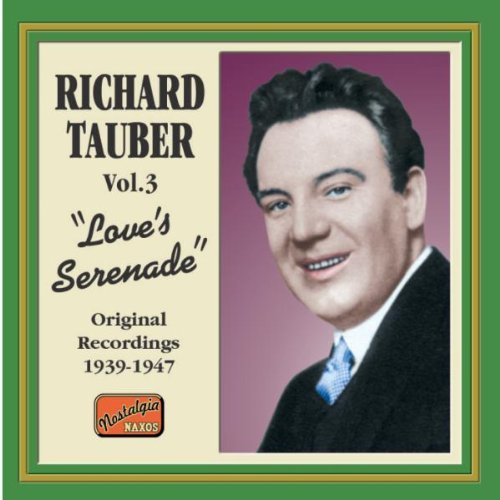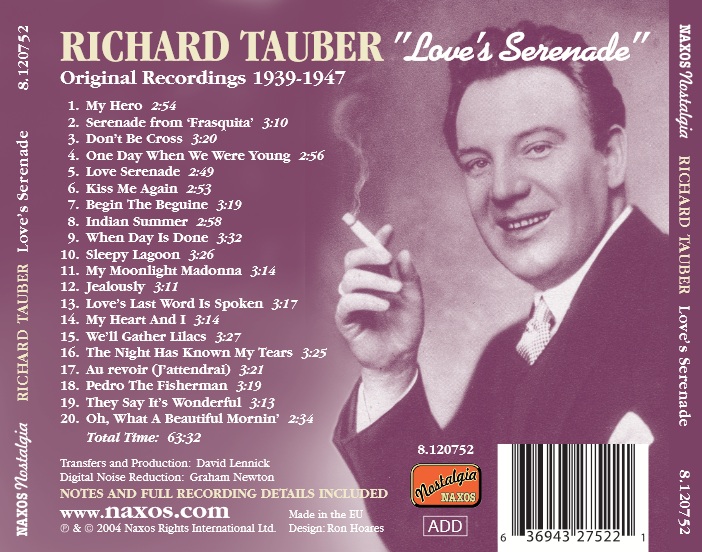Logowanie
OSTATNI taki wybór na świecie
Nancy Wilson, Peggy Lee, Bobby Darin, Julie London, Dinah Washington, Ella Fitzgerald, Lou Rawls
Diamond Voices of the Fifties - vol. 2
Tylko 1000 egzemplarzy!!!
DVORAK, BEETHOVEN, Boris Koutzen, Royal Classic Symphonica
Symfonie nr. 9 / Wellingtons Sieg Op.91
nowa seria: Nature and Music - nagranie w pełni analogowe
Petra Rosa, Eddie C.
Celebrating the art and spirit of music - vol. 3 - Pure
warm sophisticated voice...
Peggy Lee, Doris Day, Julie London, Dinah Shore, Dakota Station
Diamond Voices of the fifthies
Tylko 1000 egzemplarzy!!!
SAMPLER - STS DIGITAL, Buddy Tate, Milt Buckner, Walace Bishop
Jazz Masters - Legendary Jazz Recordings - v. 1
proszę pokazać mi drugą taką płytę na świecie!
Chesky! Niezmiennie perfekcyjny
Winylowy niezbędnik
ClearAudio
Double Matrix Professional - Sonic
najbardziej inteligentna i skuteczna pralka do płyt winylowych wszelkiego typu - całkowicie automatyczna
Richard Tauber
Love's Serenade - Vol.3

- Richard Tauber - tenor
Original Recordings 1939 - 1947
"Decked in monocle and top-hat, in his own lifetime Tauber ‘the voice of tenor romance incarnate’ was both an operetta matinee idol and a best-selling balladeer through scores of mid-price magenta-label Parlophones (which, being so frequent, were know jocularly at EMI as ‘Tauberphones’). Indeed, so all-embracing was the populist Tauber’s assumption of the latest frivolities from show and film that in some circles his stature was for a time positively underrated. However, whereas it was for many years fashionable to regret his investment of so many trifles with that quintessentially Viennese charisma, during recent decades it has become more fashionable to reappraise Tauber as a pioneer of ‘cross-over’ whose high musicality and fiercely self-critical standards transcended all purely commercial considerations – a master to whom any song worthy of his consideration was Schubert. The product of an age in which individuality in performance was actively encouraged, Tauber was essentially Schubertian – or, perhaps more precisely, Mozartian (that is instrumental) in his approach to singing. An acclaimed recitalist, in more populist guise he gave a captivating, if rather stylised, portrayal of Schubert in the 1934 BIP film Blossom Time, while operas by Mozart were to provide the vehicles both of his stage debut in 1913 and of his Covent Garden ‘farewell’, two weeks before his death, on 8 January 1948. Musicianly and stylish, beneath that all-pervading and often distracting veneer of romanticism, Tauber was always disciplined in his art, his controlled lyricism consciously attuned to the more intimate dimensions of lieder and miniatures in general. A fine songwriter in his own right, he was also an above-average pianist and an underestimated (and until his last years a frustrated) conductor. Richard Denemy Tauber was born illegitimately to theatrical parents in Linz, Austria, on 16 May 1891 and although he was never far removed from singing he at first showed no great inclination for it, despite encouragement offered him during his teens by the tenor Heinrich Hensel. Richard’s joint talents for piano and composition were honed at the Conservatory of Frankfurt-am-Main while his burning ambition to become a conductor would remain latent for the rest of his life. In 1910 he was finally persuaded to embark on a short course of study in Freiburg with the Heldentenor Carl Beines, the ‘great musician’ whom he would later acknowledge as ‘the most important man in my life’. Instantly recognising his young pupil’s potential, Beines proceeded to fulfil his promise to make him ‘the greatest Mozart singer in the world’. In 1912 Tauber was offered a contract by the Wiesbaden Theatre, of which his father had been made Director, but opted instead to continue his studies with Beines. In March 1913 the fledgling tenor made a more high-profile solo debut at the Neues Stadt-Theater in Chemnitz, in Die Zauberflöte and a few days later appeared in Der Freischütz, securing for himself a five-year contract with the Dresden Royal Opera. His operatic career was as notable for its diversity (a quick study thanks to his all-round musical accomplishment, at Dresden alone he sang, often at short notice, lyric-tenor leads in over sixty operas) and his guest appearances at other leading European opera houses included operetta, a new direction he would continue to follow even more assiduously during the following decade. In 1930, in Berlin, he also branched into the then new medium of screen-musicals. Operetta in orientation (tailored to emphasise their star tenor, with plots subordinated to musical content) these included Das lockende Ziel (1930) and Die grosse Attraktion (1931). Tauber’s closest affiliation, however, was with stage-operetta and in particular with the works of the Hungarian Franz Lehár (1870-1948), whose Frasquita (premiered in 1922, at the Theater an der Wien) was to provide Tauber with an entrée to a lifelong association, from 1924 onwards, that included his creations in Friederike in 1928 and in the opera Giuditta, Lehár’s last work, in 1934. The tenor lead in Frasquita had earlier been created by Hubert Marischka (Tauber having been the fourth successive tenor during the show’s initial 195-performance run) but both in its original version “Hab’ ein blaues Himmelbett” and in Reginald Arkell’s translation, Serenade was to prove one of the tenor’s most regularly encored theme-songs. With My Hero, from The Chocolate Soldier by the Vienna-born Oscar Straus (1870-1950), Tauber opens with a number which sopranos, rather than tenors, regularly stopped the show. Premiered in Vienna in 1908 as Der tapfere Soldat (The Brave Soldier) this now-forgotten operetta based on George Bernard Shaw’s Arms And The Man was once a major draw, which ran for 296 showings on Broadway (Lyric Theater) from 1909 before touring America, and in London for 500 performances at the Lyric (in 1910) prior to enjoying successful revivals in 1914, 1932 and 1940. Another appropriated soprano air with which Tauber both charms and disarms is Don’t Be Cross, a translation by Clifton Bingham (1859-1913) from the English production of Der Obersteiger (The Foreman), a popular Viennese operetta of 1894 by Karl Zeller (1842-1898). From other stage-works Tauber recorded a diverse range of ‘favourites’, and our programme offers some of the more significant of these. Kiss Me Again (with lyrics by St Louis-born playwright and librettist Henry Blossom (1866-1919) this is the best-remembered number from Mlle. Modiste, a 1905 Broadway musical by Dublin-born American Victor Herbert (1859-1924) – Tauber also offers a fine rendering of Indian Summer, originally a piano solo interpolated into Herbert’s 1919 musical The Velvet Lady, this was made a song in 1939, with lyrics by New York librettist Al Dubin, 1891-1945). A hit from his longest-running show Perchance To Dream (1,022 performances, London, 1945), We’ll Gather Lilacs still ranks high among the best-loved encores of Ivor Novello (1893-1951) – and Tauber’s is surely the best of its contemporary non-cast recordings. From the Broadway musicals Oklahoma! (1943) and Annie, Get Your Gun (1946) come, respectively, Oh, What A Beautiful Mornin’ and They Say It’s Wonderful (unusual repertoire for Tauber, it may still be thought), while Begin The Beguine (first heard in Cole Porter’s short-lived 1935 Broadway venture Jubilee) and My Heart And I (from Tauber’s own long-running London musical production of 1943, Old Chelsea), typify the tenor’s highly individual style. From the world of films our selections include the ever-popular One Day When We Were Young (one of several borrowings from Johann Strauss II incorporated into the score of The Great Waltz, a 1938-vintage Oscar-winning Hollywood mélange from MGM, which featured soprano Miliza Korjus) and Pedro, The Fisherman (with ridiculous lyrics by Harold Purcell which even Tauber is hard put to redeem; this song, which ‘kept Britons humming’ through World War 2, was aired by the tenor himself in the 1946 British National filming of the stage show Lisbon Story). Among the ballads, non-operetta and non-film period-pieces made memorable in Tauber renditions are Love Serenade (a posthumous vocalising of a waltz-theme from the 1900 ballet Les millions d’Arlequin by Paduan composer-conductor Riccardo Drigo, 1846-1930), When Day Is Done (with words by New York-born Buddy G. De Sylva (alias George Gard, 1895-1950) and music by Viennese-born master of the revue-operette Robert Katscher (1894-1942), this dates from 1926), Sleepy Lagoon (a vocal version of the 1930 orchestral miniature ‘By The Sleepy Lagoon’ by Nottinghamshire-born Eric Coates,1886-1957), My Moonlight Madonna (a 1933 vocal adaptation of ‘Poème’, Opus 41, No.6 for piano, by the Czech pianist-composer Zdeneˇk Fibich, 1850-1900) and Au revoir (also known as ‘J’attendrai’, a cabaret favourite first heard around 1937 and subsequently became better known via a best-selling disc by the Corsican tenor Tino Rossi)." Peter Dempsey, 2004





























